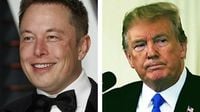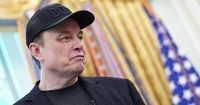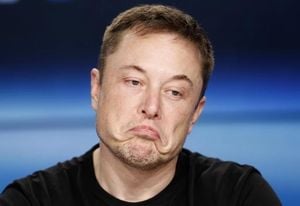Shares in Tesla took a sharp dive on Monday, July 7, 2025, as CEO Elon Musk announced the creation of a new political entity, the America Party, signaling a renewed plunge into the political arena that has investors deeply concerned about the company's future. Tesla's stock plunged by over 7%, wiping approximately $76 billion (£56 billion) off the company's market capitalization, which fell from just over $1 trillion to about $940 billion shortly after the opening bell on Wall Street. Musk's personal stake in Tesla also dropped by nearly $10 billion, reducing his holding to below $120 billion, though he remains the world’s richest person with an estimated net worth of $400 billion, according to Forbes.
The plunge reflects mounting investor anxiety that Musk’s political ambitions could distract him from his role as Tesla's CEO during a critical period for the electric vehicle manufacturer. This concern comes amid a backdrop of declining sales, intensifying competition, and the fallout from Musk's earlier political involvement. Tesla reported a 13.5% drop in vehicle deliveries in the second quarter of 2025 compared to the same period in 2024, marking the company’s first-ever annual sales decline as a public company with a roughly 1% drop in 2024. The company now faces the challenge of delivering over one million vehicles in the second half of the year to avoid another annual sales decline.
Musk’s political reemergence follows a turbulent period marked by his involvement with the Trump administration earlier this year, where he headed the Department of Government Efficiency (DOGE). His tenure at DOGE was controversial, sparking protests at Tesla showrooms worldwide and contributing to a consumer and investor backlash. Musk stepped down from his government role in May 2025, which initially buoyed Tesla’s stock. However, his recent public clash with former President Donald Trump over the “big, beautiful bill” — a massive tax and spending package signed into law on July 4, 2025 — has reignited tensions and investor concerns.
On June 30, Musk criticized the bill on his social media platform X, condemning its record $5 trillion increase in the debt ceiling and dubbing the political landscape the “PORKY PIG PARTY.” Following the bill’s passage, Musk launched a poll on July 4 asking whether the public wanted him to start a new political party, with 65.4% voting in favor. He announced the formation of the America Party the next day, declaring, “Today, the America Party is formed to give you back your freedom.” Musk suggested the party would focus on influencing a handful of key Senate and House seats, aiming to sway votes on contentious legislation to better reflect the “true will of the people.”
President Trump responded with sharp criticism on his Truth Social platform, calling Musk a “TRAIN WRECK” who had gone “completely off the rails” over the past five weeks and labeling the formation of a third party “ridiculous.” Trump warned that third parties historically fail in the United States and only create “Complete and Total DISRUPTION & CHAOS.” The former president also threatened to target Tesla’s government subsidies and contracts, which have been a significant source of support for the company.
Investor strategists and analysts echoed the unease. Neil Wilson of Saxo Markets highlighted two primary concerns: the risk of Musk’s feud with Trump leading to cuts in US government electric vehicle subsidies, and the prospect of Musk becoming distracted from Tesla’s core business. “Investors had cheered Musk stepping back from frontline politics but are now worried he’s going to be sucked back in and take his eye off Tesla,” Wilson said.
Dan Ives, global head of technology research at Wedbush Securities, noted a “broader sense of exhaustion” among Tesla shareholders, emphasizing that Musk’s deeper dive into politics runs counter to what investors want during this crucial phase for Tesla. “While the core Musk supporters will back Musk at every turn no matter what, many investors are fatigued by his ongoing political detours,” Ives said.
Adding to the unease, an investment firm, Azoria Partners, delayed the listing of a Tesla exchange-traded fund, citing concerns about Musk’s ability to serve as a full-time CEO while managing his political ambitions. Its CEO, James Fishback, remarked, “We have real concerns about Elon's ability to be a full-time CEO for Tesla with his new full-time job running 'America Party.'”
The Tesla board, chaired by Robyn Denholm, has faced scrutiny over its oversight of Musk’s activities. Denholm denied reports in May that the board was seeking to replace Musk, and has historically supported Musk’s leadership and compensation, although a Delaware judge rejected his record-breaking $56 billion pay package in early 2024. Legal experts like Ann Lipton, a professor at the University of Colorado Law School, have commented that typically a board would intervene to limit such distractions or even remove a CEO, but Tesla’s board has been “fairly supine” in this regard.
Meanwhile, Tesla’s market challenges are mounting. The company is poised to lose its title as the world’s largest electric vehicle manufacturer to Chinese automaker BYD, despite BYD not yet entering the US market. The expiration of the US EV tax credit subsidy at the end of September 2025 — earlier than the previously scheduled 2032 expiry — is expected to dampen near-term electric vehicle sales across the industry.
Adding to market pressures, US President Donald Trump announced 25% tariffs on imports from Japan and South Korea on the same day, contributing to a broader market selloff that saw major indexes fall over 1%. Tesla shares, often seen as a bellwether for the EV sector, have mirrored these broader market jitters.
Despite the turmoil, Musk remains undeterred. His announcement of the America Party reflects a desire to challenge the entrenched two-party system, which he describes as a “one-party system” rife with “waste & graft.” Whether this political gamble will pay off remains to be seen, but for Tesla investors, the stakes could not be higher. As one shareholder, Shawn Campbell of Camelthorn Investments, put it, “I and every other Tesla investor would prefer to be out of the business of politics. The sooner this distraction can be removed and Tesla gets back to actual business, the better.”
For now, Tesla’s trajectory is uncertain. The company must navigate declining sales, investor jitters, political crossfire, and leadership distractions — a complex web that will test Musk’s ability to steer both his company and his political aspirations successfully.





